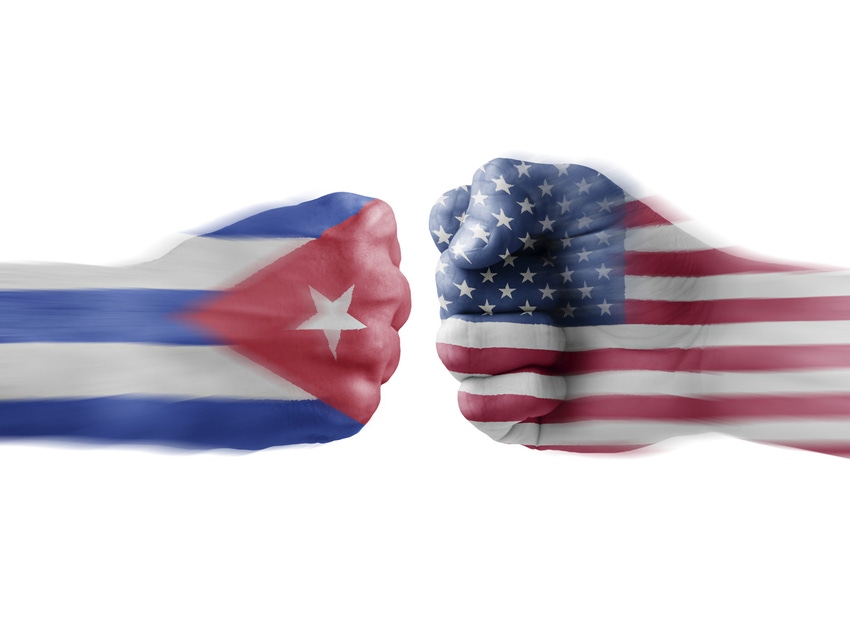Legislative Watch: Ag groups none to happy about Cuba plans; groups want COOL revived; export programs supported; Doud nominated as ag trade ambassador.

U.S. agriculture is not happy with President Trump’s announcement on placing new restrictions on Cuban travel and business. The new policies will ban U.S. companies from doing business with Cuban companies that are controlled by Cuba’s military or intelligence agencies and will limit some tourism.
The Cuban military is known to control a significant amount of the Cuban economy, especially hotels, tour bus companies and supermarkets.
The American Farm Bureau Federation says, “We urge the administration to exercise caution in rolling out any new restrictions on doing business with Cuba that would limit our agricultural export opportunities. We should be doing more, not less, to encourage U.S. agricultural exports to Cuba.”
The U.S. Grains Council says, “While the announcement today will make our efforts in Cuba more difficult — and almost certainly cost U.S. corn farmers sales in the short term — we have every intention of continuing our work there to build long-term, mutually beneficial trade.”
Under the administration’s new policy both countries will continue to maintain their embassies. In reaction to the president’s announcement, Cuban Foreign Minister Bruno Rodriguez reminds everyone how many U.S. presidents have wanted to wait until the Castros are not in power. He says, “We have the patience, the resistance” to wait out Trump.
Groups file suit to require COOL
R-CALF USA and the Cattle Producers of Washington have filed a lawsuit in federal court in Spokane, Wash., against the USDA seeking to require meat to again be labeled if it’s produced in other countries and imported into the United States.
The lawsuit claims that when the USDA changed the requirement in March 2016 it violated the nation’s Meat Inspection Act. Public Justice says, without country-of-origin-labeling, “domestic ranchers and farmers tend to receive lower prices for their meat because multinational companies can import meat and misleadingly present it as homegrown.”
In 2015, the World Trade Organization ruled against the U.S. COOL requirements and in favor of the case brought by Canada and Mexico. The WTO said Canada and Mexico could retaliate against U.S. products by imposing $1.1 billion in tariffs. Congress in December 2015 repealed COOL requirements for beef and pork by eliminating the COOL provisions from the Agricultural Marketing Act. Congress did not, however, address the language in the Meat Inspection Act.
Ag groups support FMD and MAP
A group of 179 national and state agricultural organizations sent letters to the leadership of the House and Senate Agriculture Appropriations subcommittees strongly urging them to fully fund USDA’s export programs — Foreign Market Development Program and Market Access Program.
The organizations remind the subcommittees how important agricultural exports are to the farm economy and much of this success is the result of the FMD and MAP. A July 2016 study of export demand by Informa Economics IEG, working with Texas A&M and Oregon State University, found that FMD and MAP generated a return on investment between 1977 and 2014 of $28.30 in export gains for every additional $1 spent on foreign market development.
FMD and MAP are responsible for 15% of total agricultural export revenue. The study also found that if the two programs were eliminated, which the administration is proposing, agricultural exports would decline by $14.7 billion per year.
Those signing the letter include National Cattlemen’s Beef Association, National Chicken Council, National Pork Producers Council, National Renderers Association, North American Meat Institute, U.S. Cattlemen’s Association and the U.S. Meat Export Federation.
Doud nominated to be USTR ag trade ambassador
Gregg Doud has been nominated by President Trump to serve as the U.S. Trade Representative’s chief agricultural negotiator or agricultural trade ambassador.
Doud is a popular choice with the agricultural community. He is currently serving as president of the Commodity Markets Council. Previously, he served on the Senate Agriculture Committee in helping with the 2014 farm bill, and served for eight years as chief economist for the National Cattlemen’s Beef Association where he was deeply involved in trade policy.
Doud is a graduate of Kansas State University with a master’s degree in agricultural economics. The agriculture community is pushing that Doud be confirmed quickly. He needs to be in place with the North American Free Trade Agreement renegotiations expected to begin in August.
About the Author(s)
You May Also Like



